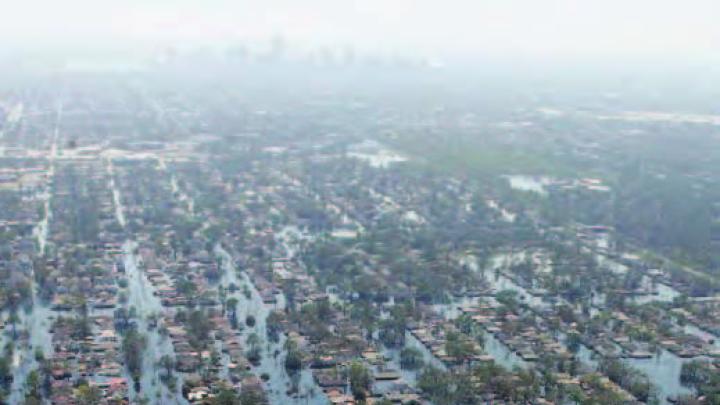In the immediate wake of Hurricane Katrina, President Bush promised to “do what it takes” to help New Orleans’s residents “rebuild their communities and their lives.” The scale of the human tragedy, combined with mounting evidence of government failures at many levels, precluded public debate, at least initially, on the economic rationale of Bush’s pledge. But in the ensuing weeks, economists have begun to ask a politically prickly question: Is restoring New Orleans to its former size actually in the national interest—or even in the best interests of Katrina’s victims?
According to Glimp professor of economics Edward Glaeser, who directs the Taubman Center for State and Local Government and the Rappaport Institute of Greater Boston, the answer is no. In a recent issue of the on-line journal The Economists’ Voice, he argues that it would be better to give federal money directly to displaced New Orleans residents than to spend it on expensive reconstruction projects in the city’s devastated neighborhoods. “When you have a car crash or your house burns down,” he says, “the insurance company sends you a check. It doesn’t provide you with a new car or a new house.” Federal disaster insurance, he contends, should similarly insure people, not places—especially when the place is a city suffering a decades-long decline.
Glaeser, who specializes in urban economics, believes that “there are cities in America that may not be worth rebuilding in the wake of a disaster.” These cities were built around industries that have since become obsolete. As urban productivity falls, the most active members of the labor force flee; but, because housing is durable, their homes remain. People less connected to the labor market move into those homes, even though wages continue to fall and businesses shut. Such places become centers of social distress; their populations are simply too poor to leave.
New Orleans fits this pattern. Beginning in 1960, mechanized technology and containerization dramatically reduced the number of people needed to run the port—once the city’s lifeblood. Today the port employs a mere 7,500 people. The lucrative energy industry employs even fewer residents: under 2,000 in oil and gas extraction, and not even 100 in pipeline transportation. By contrast, 32,000 people work in healthcare and social assistance, while 37,000 work in food services and accommodation—i.e., tourism. The dearth of well-paying jobs has caused the city’s population to shrink from 627,000 in 1960 to 485,000 in 2000. An additional 40,000 people left the city between 2000 and 2004. Of those who remained, more than a quarter lived below the poverty line, according to the 2000 census. Unemployment ran as high as 11 percent in 2004.
These dismal statistics, combined with the city’s high cost of construction and low real-estate values, suggest to Glaeser that rebuilding New Orleans to its pre-hurricane scale is unlikely to improve the lives of the city’s worst-off residents. “The truth of the matter,” he says, “is that what will be done under a rebuilding plan is that vast sums of money will be transferred to corporations receiving the rebuilding contracts, rather than to poor people.”
Alternatively, the federal government could take the $100 billion slated for New Orleans reconstruction and issue each city resident a check for $200,000—the equivalent of 10 years’ income for a population earning an average of $20,000 a year. Spreading the same money across the larger metropolitan area would give each resident $75,000—enough, Glaeser argues, to pay for a home in many parts of the country. Payouts could be made at least partially in the form of vouchers in order to allay anxieties over the potential misuse of funds. The important point is that residents not be locked into a future of poverty based on locale. “The usual lesson from economics,” he argues in his article, “is that people are better off if they are given money and allowed to make their own decisions.”
Glaeser envisions a future New Orleans reduced to a size commensurate with its economic capacity. The port and petroleum industry would be fully restored, but not with federal tax dollars. Instead, users of these economic entities would pay for infrastructure repair, and consumers would ultimately take on the cost in the form of higher prices. The tourism and entertainment sectors would similarly bounce back without federal help, since the historic district suffered relatively little damage from Katrina and private investors would likely step forward. But the neighborhoods that housed the city’s poor and unemployed would be gone; their inhabitants would have moved on in search of brighter prospects in growing cities like Houston, Atlanta, or Las Vegas.
Of course, Glaeser’s plan ignores the sentimental attachment people feel toward their home communities, but he counters, “What would Katrina survivors benefit from more—$100,000 or salvaging a ‘tie to place’?” He believes most residents would choose money, but he acknowledges that politicians are unlikely to embrace such a proposal. “The mayor and the governor are place-based,” he says. “They want aid in their areas that they can control.” The federal government, he notes, similarly wants to be seen as doing something good, and rebuilding gives that impression. Nevertheless, Glaeser hopes that his economic argument for “helping poor people rather than poor places” will at least make it legitimate to question the large-scale rebuilding of New Orleans or other declining cities in the wake of disaster.
~Ashley Pettus
Edward Glaeser e-mail address: eglaeser@kuznets.fas.harvard.edu








